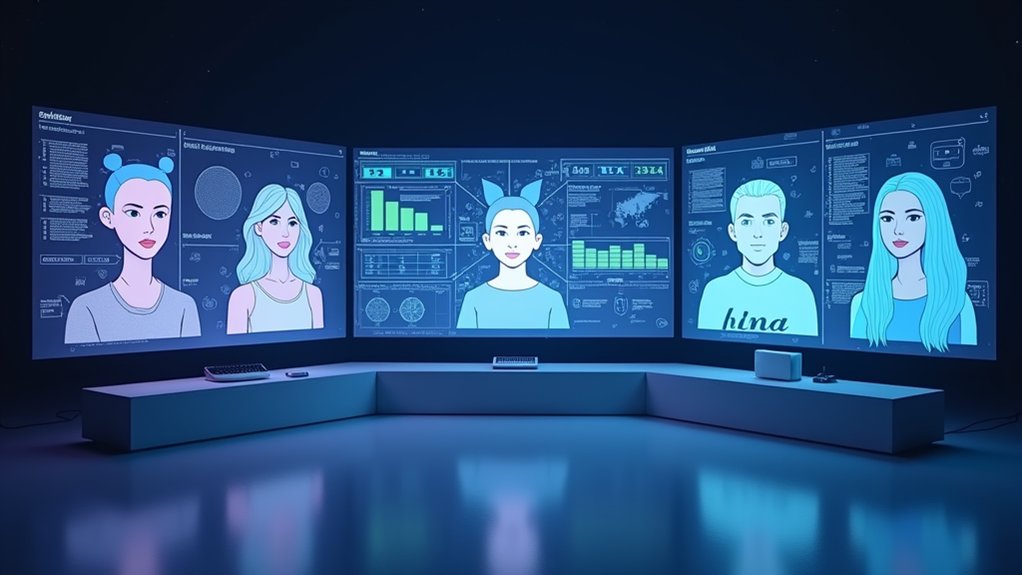Who Are AI Influencers?
AI influencers are virtual personas created through deep learning algorithms, graphic design, and natural language processing. These digital entities provide brands with controlled, consistent promotion strategies while maintaining realistic interactions across platforms. Unlike human counterparts, AI influencers operate 24/7, deliver uniform messaging, and adapt to trends through machine learning capabilities. Notable examples include Miquela Sousa, who has amassed over 2.9 million Instagram followers and secured partnerships with prestigious brands. The technology behind these virtual personalities combines creative storytelling with algorithmic precision for ideal engagement.

While the digital marketing landscape continues to evolve, AI influencers have emerged like a sophisticated alternative to human social media personalities, offering brands unprecedented control and consistency in their promotional strategies. These virtual entities are created through a complex process that combines deep learning algorithms for human-like traits with graphic design elements to enhance visual appeal.
The development includes programming realistic interaction capabilities using natural language processing (NLP) for comment responses and conversations, generating multimedia content aligned with predefined personas, and deploying across various social media platforms with automated functionality.
AI influencers distinguish themselves through several key characteristics that make them attractive to marketers. They maintain uniform tone and messaging across all interactions, utilize data-driven personalization to adjust content based on audience analytics, and seamlessly incorporate with platform APIs for real-time engagement.
Their machine learning foundations enable continuous adaptation to emerging trends and audience preferences, while providing 24/7 interactivity without human intervention requirements. These digital personalities are designed to simulate human behavior while avoiding typical human limitations such as fatigue and inconsistency.
The personality development of these virtual influencers relies heavily on NLP and machine learning training using datasets of human interactions. This training creates distinct communication styles through algorithmic analysis of language patterns and programs appropriate emotional responses based on behavioral and linguistic data. Similar to how ChatGPT leverages large language models to generate creative content tailored to specific prompts, AI influencers can produce customized messaging that resonates with target audiences.
The result is a brand-aligned communication style that remains consistent without the variability intrinsic in human influencers.
Content generation for AI influencers includes high-quality multimedia production that strictly adheres to predefined guidelines, narrative serialization to deepen audience connections, and real-time adjustment to match social media trends.
These virtual personalities operate through sophisticated technical integrations that enable autonomous posting, cross-platform management, and extensive performance analytics.
The monetization strategies for AI influencers parallel those of human counterparts, with data-driven campaign optimization offering a significant advantage. Among the most successful examples is Miquela Sousa, who has garnered over 2.9 million Instagram followers and secured partnerships with prestigious fashion brands.
As the technology continues to advance, these virtual personalities represent an increasingly viable marketing channel that combines creative storytelling with algorithmic precision, offering brands both creative flexibility and operational control in their influencer marketing initiatives.
Frequently Asked Questions
How Much Do AI Influencers Typically Earn?
AI influencers earn considerably less than their human counterparts, averaging $1,694 per sponsored post compared to human influencers’ $78,777.
This substantial cost difference stems from AI influencers‘ scalability and brand-safe nature. Their pricing structure increasingly leans toward conversion-driven models rather than flat fees, with measurable performance metrics directly linked to sales outcomes.
This cost-effectiveness, combined with predictable revenue generation, makes AI influencers particularly appealing for e-commerce and DTC brands.
What Educational Background Do Most AI Influencers Have?
Most AI influencers possess advanced academic credentials in computer science, mathematics, or related technical fields, typically holding master’s degrees or PhDs.
The available data indicates significant educational overlap with researchers at prestigious institutions, since evidenced by their capacity to effectively analyze complex publications.
While extensive demographic studies remain limited, their demonstrated technical expertise in disseminating and contextualizing research papers suggests substantial formal education combined with industry experience in machine learning and artificial intelligence domains.
Do AI Influencers Need Technical Coding Skills?
While AI influencers don’t necessarily require extensive coding expertise, basic technical competencies offer significant advantages.
Modern content creation relies heavily on no-code/low-code platforms and AI-powered tools that minimize technical barriers. Rudimentary Python knowledge facilitates automation of repetitive tasks, while familiarity with social media APIs enables efficient content distribution.
Success depends more on creative skills like storytelling and brand consistency than programming proficiency, though understanding data analytics fundamentals remains valuable for optimizing engagement metrics.
How Long Does It Take to Become an AI Influencer?
Developing an AI influencer requires 3-6 months for a basic implementation, with fully realized personalities taking 6-12 months.
Key timeline factors include:
- Technical complexity level of AI systems
- Visual assets development (3D modeling, animation)
- Content strategy sophistication
- Platform-specific adaptation requirements
Post-launch, companies must allocate ongoing resources for at least 1-2 years to establish significant market presence through continuous refinement and performance monitoring.
Can AI Influencers Maintain Anonymity While Being Successful?
AI influencers intrinsically maintain anonymity while achieving success through their nature as virtual entities without real human identities.
This anonymity serves both a feature and strategic advantage, allowing brands complete control over the persona’s presentation and messaging.
Unlike human influencers whose personal lives may compromise campaigns, AI personalities remain shielded from reputation risks while still establishing meaningful audience connections.
Their success metrics typically depend on engagement rates rather than authentic human experience disclosure.